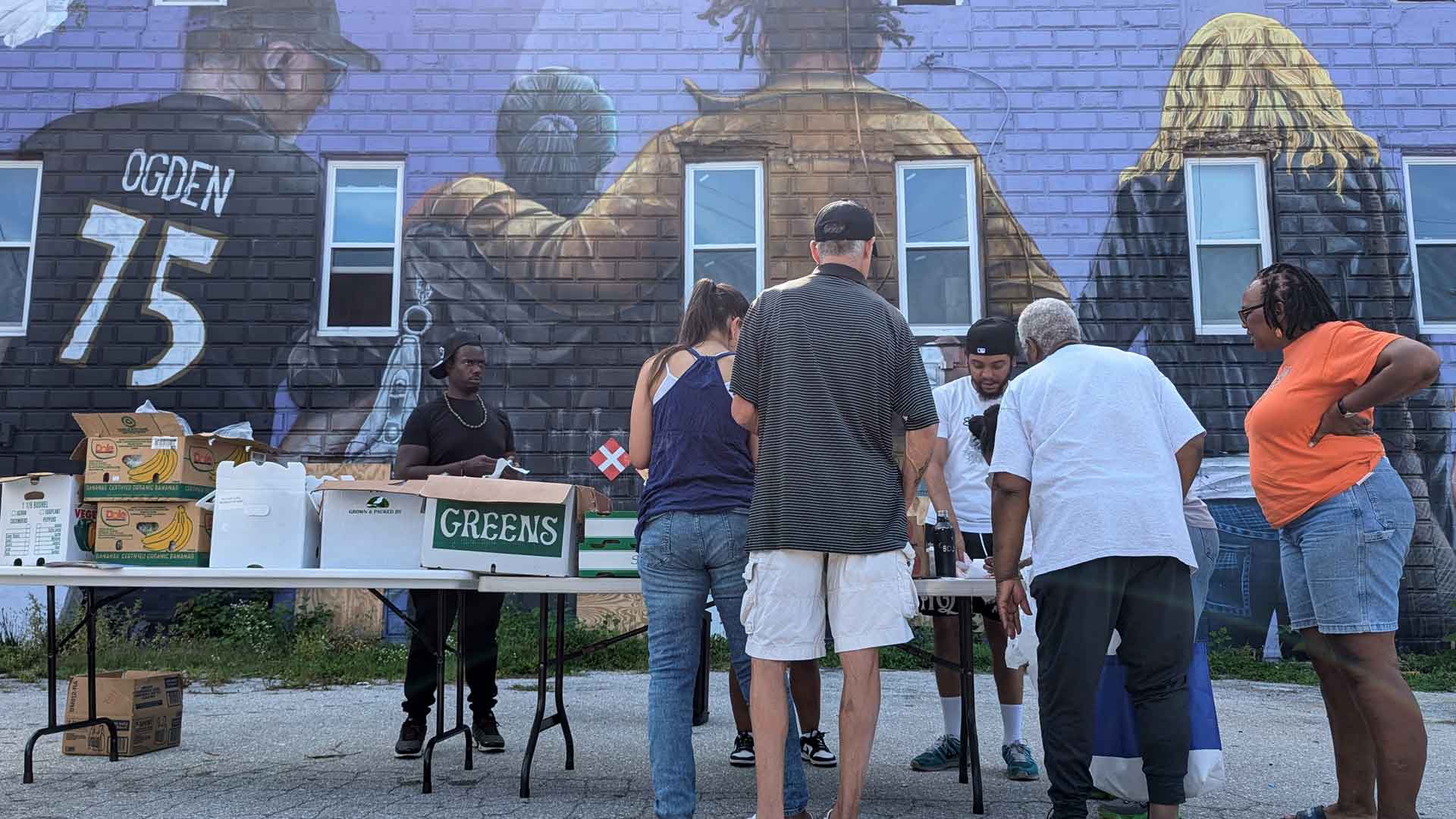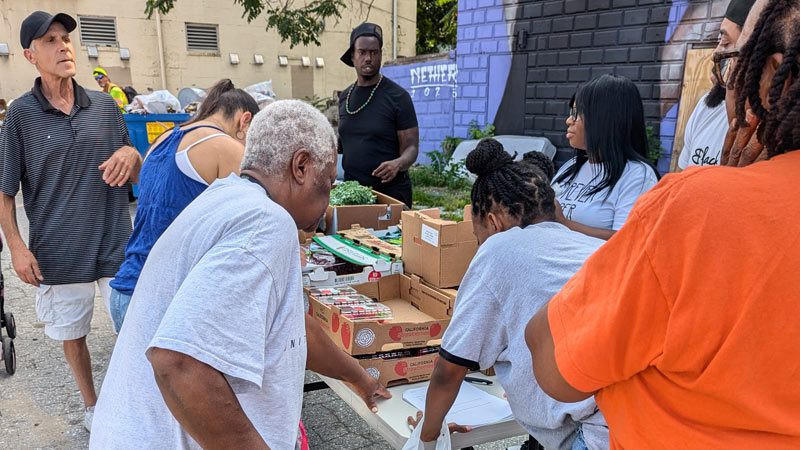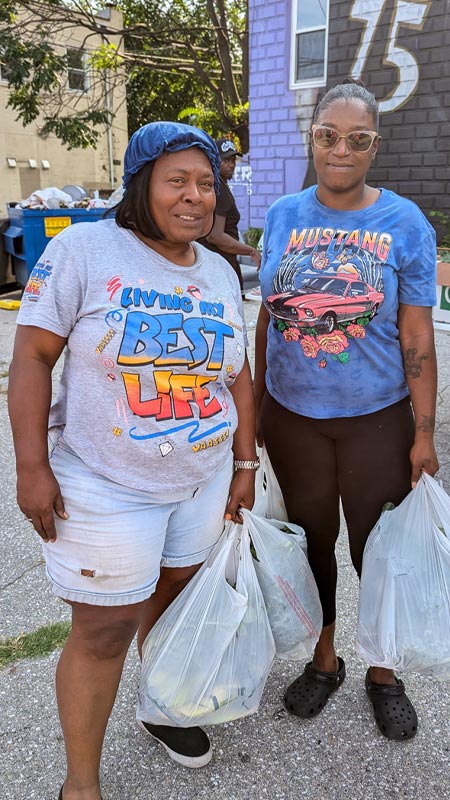Partner Profile: Black Yield Institute

Founded in the Cherry Hill community in 2015, the Black Yield Institute (BYI) is on a mission to “create a self-determined and self-reliant community of Black institutions, Black-owned businesses and people of African descent in Baltimore’s poor and Black food environments.”
And for the last 10 years, BYI has been ensuring that those food environments have access to healthy foods, consistently broadening the scope of their work to include Curtis Bay and other surrounding South Baltimore neighborhoods.
“We’re not just trying to get the healthy foods or make sure there’s access to the healthy foods,” said Twan Doe, BYI’s Director of Operations and Culture. “We’re trying to affect the food supply chain at large, and our community has to be a part of everything—from growing, harvesting, and processing, to selling, delivering, and even using the foods to manufacture different products—to truly benefit from it.”

Measuring Success Through a Lens of Trust
While there is plenty of quantified data (pounds of food distributed, number of farming partnerships, amount of people politically educated), Twan feels the more quantitative measure of awareness.
“The narratives, or misconceptions about our communities not being interested in healthy foods are finally being debunked. I feel like the interest has always been there, but now, the actions are starting to be unearthed,” he said.
Twan has definitely seen a change in impact and action at distribution events.
“When we come to do our Mutual Aid Markets, people are waiting on us, like there are lines, which is good because it means people are starting to trust us,” he added.
Twan describes trust of the community as something intangible, that might not show up on a stat sheet but is most definitely a key measure of success.
“It’s nuanced, but in keeping the vulnerable folks we’re here to serve central to the process, you know, we talk to them, and they’re willing to talk to us—knowing we can meet their needs in a safe space—I think that is a good measure of success!”
He sees that trust as foundational to building mutually beneficial relationships and being in community together.
And that seemingly subtle difference between “being in community,” and “being part of a community,” is deeply important to BYI’s success.
One of Twan’s favorite sayings is “we can’t have community without unity,” but broke it down even further.
“It’s important that we are one accord as we do this work. Being in the community as individuals has its advantages but being, working, serving together is more functional for our vision,” said Twan. “If we are to effect the material lives of those we are committed to serving we must always strive to be in community together,” he continued.
When asked why trust might still be an issue when Black Yield Institute comes into a community, Twan pulled back the curtain, offering a frustrating view into the deeply seated mistrust among some neighbors.
“There were times when those faces came in, and there were faces behind those faces, the real decision-makers with ulterior motives or agendas,” he said. “There were hidden terms and conditions behind things, making the process extractive, not reciprocal as it should be—that’s why we call them Mutual Aid Markets, because both sides benefit,” Twan continued.

The More You Know, the More You can Help
To bring about a deeper understanding of how these processes and systems developed, but more importantly how to bring about change, Black Yield Institute implores people to become better educated.
“I would say the best way people can help is through political education, learning about the issues, and getting involved,” shared Twan. “And political education to us means becoming educated on the ways in which systems work and the ways in which they affect us and being clear on how to come up with strategies to affect change in those systems,” he continued.
BYI offers a number of ways to become educated, from trainings to a dedicated school. Warrior Healer trainings just recently opened up to the public to help people become comfortable being their true, authentic selves, while the Sankara-Hamer Academy is a school dedicated to “engaging with ideas and producing knowledge that can assist with publishing radical scholarship in service to the movement towards black land and food sovereignty.”
“We have to show up as ourselves consistently, and the community has to see that and be able to rely on that authenticity for our organization to work.”
Authenticity Helps Build Community
And that concept of authenticity is deeply embedded in everything that BYI does.
“We have to show up as ourselves consistently, and the community has to see that and be able to rely on that authenticity for our organization to work,” said Twan. “These relationships have to develop organically—if we’re not authentic, no one is going to lower their guard, and become part of this movement.”
Twan and his colleagues know it’s working just by observing the nearby neighbors, some of whom actually walk by the food distribution and keep going but will come back later in the day.
“What I’ve had happen is people are reluctant at first and want to see how it goes for other people—they hear the conversations we’re having, and once I introduce myself to them, let them know what we’re doing and that it’s up to them if they want to be a part of it, people start to feel a little more empowered,” Twan stated.
And sometimes, once people become empowered, they decide that they want to show up better for the community, and volunteer with Black Yield Institute.
The Future of The Movement
Now in their 10th year, BYI seeks to build an even larger movement through a dedicated campaign.
“Our campaign is focused on creating even more opportunities for folks to get involved and be more vocal about what has been going on and show people how they can be supportive and helpful to the movement,” noted Twan.
Twan also shared that some of those 10th anniversary efforts will revolve around history, which he hopes can offer a path forward through a series of “Maroon Mixers,” opportunities for people doing the work in the city to come together to collectively work toward a better future.
“When we talk about the maroon movement, we’re talking about those people, ancestors in movement throughout the diaspora, who took their freedom and maintained their independence after liberating themselves,” Twan stated.
BYI seeks to study and understand the ways in which they were able to do that without outside influence in the early 1800’s, and how those experiences may offer solutions in 2025 and beyond.
The Black Yield Institute is one of the Maryland Food Bank’s more than 780 community partners helping to end hunger in Maryland. ![]()

About The Author
Ben Gross
For more than 30 years, Ben has been helping organizations raise awareness and inspire action by creating compelling narratives. And since 2018, Ben has been the Maryland Food Bank's Staff Writer, elevating the voices of food-insecure neighbors to further the Maryland Food Bank's mission of feeding people, strengthening communities, and ending hunger for more Marylanders.
Get updates on our progress in the fight against hunger
Want to see how your involvement directly impacts the well-being of your neighbors in need? Get the latest news sent to your inbox.







